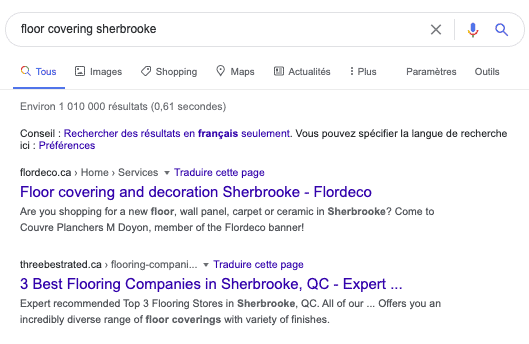SEO stands for “Search Engine Optimization” and refers to the ranking of a site, page, or product in natural search engine results.
Why is SEO a non-negotiable strategy in eCommerce?
The basis of any eCommerce marketing action is to offer your products to interested clients when they search for them. The goal of SEO is to effectively reference your business so that your potential clients can easily find your products on search engines when they are searching for them, and thus generate traffic to attract a qualified audience to your eCommerce site.
The challenge is both to determine the keywords that best match your offerings, your market, your business, and users’ search behaviors in order to meet their needs at the right time, and to structure your site with respect to these keywords.

How to define your keyword strategy?
To define your keyword strategy, it is vital to ask yourself several questions to optimize your rankings.
First, about your business: What keywords best represent your business? Each of your products? What searches do you want to appear in? At what stages do you wish to capture the attention of your target audience?
Next, about your market: What keywords do your competitors use? What differentiates you from them?
Your keywords must correspond to users’ search intent and must be associated with the content of your eCommerce.
Several tools can help you build your keyword strategy: Ahrefs, SemRush, Keyword Planner or Google Trends.
The objective is to determine, on your own site as well as your competitors’ sites, the keywords which have the largest search volume and the difficulty to rank high on these terms. The keywords should represent your business, your market, and each of your products. The more details there are in your product descriptions, the more you will reach your specific target audience.
List the keywords to use on your site and those to avoid. Favor long-tail keywords, a phrase composed of several words, which allow you to rank on each word as well as on the groupings of words.
For example, a user may search for “wood flooring at the best price” or “buy floor varennes” rather than “floor”.
How to implement your strategy?
1) A page dedicated to presenting your business (e.g. the Home Page) using generic keywords, which refer to your brand and your products, to allow users to find you according to your services and market.
2) “Category” pages, each with their own URL with specific content to describe your different product categories.
3) Product pages, which must contain the name of your items as well as all their features. These descriptions must be unique and original, respecting your keyword strategy.
E.g. Waterproof red spring coat with hood vs. coat
Your pages will have to be built accordingly. The H1 tag, the <Title> as well as the meta descriptions must contain the full name of your article.
E.g. Waterproof red spring coat with hood XX brand vs. red coat
The URLs should correspond to your products:
E.g. site.com/coat/collection-a/waterproof-red-spring-coat-with-hood
vs. site.com/coat/1
and site.com/coat/collection-a/ waterproof-green-spring-coat-with-hood
vs. site.com/coat/2
All your images must be renamed to be listed in Google’s image section. This usually takes time but allows you to expand your reach.
E.g. XX-red-coat-hood.jpg vs. img88888.jpg
Finally, if your company has several locations, we advise you to have a single page per branch with the H1 tag, title, description, and content optimized for each specific branch.
HTML page optimization – SEO audit
Other more technical optimizations are to be implemented so that your eCommerce site benefits from a strong SEO, but this generally involves an SEO audit by an expert or a web agency, as these implementations require solid technical knowledge.
Several “free” and “fast” tools offer to perform an SEO audit of your online store, but the results are unfortunately not useful. The best way to carry out this audit is to let experts evaluate your strengths and weaknesses in natural referencing, and the technical actions to be implemented to optimize it.
SOME TIPS:
- The Google algorithm attributes less importance to copy-pasted content. All content (descriptions, titles, etc.) must be unique, without exception.
- The Google algorithm values internal links between your pages. The more internal links there are to a page, the more important that page will be deemed by Google.
- URLs of pages containing your keywords are better ranked.
- A responsive mobile-friendly site is better ranked.
- High site traffic generates better natural referencing because search engines consider it a relevant result.
- Page speed is an important ranking factor.
- Regularly monitor the search volume of your keywords and analyze the organic traffic to your site to ensure that you are still being referenced in a relevant way.
In conclusion
Organic listings, SEO, corresponds to the ranking of sites, pages, and products in search engine results. This referencing is achieved through the use of keywords corresponding to your products and services. To rank high in search results, it is necessary to find keywords that correspond to users’ search intent. Several tools allow you to establish your keyword strategy, which should then be implemented on all your site pages. Digital marketing agencies can assist you in defining your SEO strategy as well as in more technical SEO optimizations.
Our eCommerce Accelerator is a customized service offering that meets every online business challenge, allowing you to quickly increase your performance.






